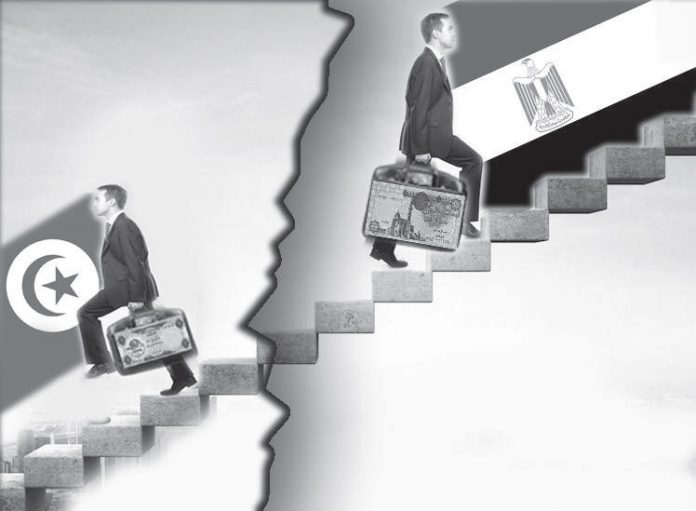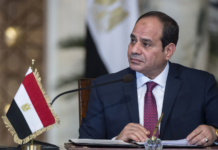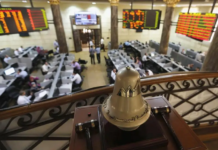Nations seek progress, in their quest to overcome problems and sufferance, the people could face new challenges or find solutions. Tunisia and Egypt are two recent examples of a fresh human experience. Both countries went through massive unrests in 2011 to protest monopoly of power and corruption, in both countries the protests led to ousting of the two countries’ presidents and ruling parties and both countries started a democratization process that included free elections leading to a climb of Islamists to power to fill the vacuum. Yet, the two endeavors didn’t quite follow the same path, notably, they split in cross roads. Although the people in both countries reached a conclusion that Islamists are not fit to rule, the Tunisians chose a smooth transition using only the ballots as a means of change leaving a considerable influence of Islamists in the Tunisian politics while the Egyptians rose up with a correcting second revolution in 2013 that removed Islamic mind map away from politics to make room for solutions that are founded on scientific human experience rather than divine orders or for what it is worth; clerical interpretations of such orders. In 2013, the Egyptians approved a crackdown on all potential terror sources and advocators by mobilizing in millions to the streets when Abdelfattah Elsisi the minister of defense at the time asked for their authorization, after which they went to the ballots and elected him president by a vast majority against his competitor. Since then, the new elected president and his appointed government took harsh measures for economic reform. Measures that are described to be a bitter medicine to a long time struggling economy battered by four more years of chaos. This new elected leader understood that the bitter medicine will shrink his popularity rates but is necessary as a cure. He free floated local currency, decreased government subsidy of power consumption, applied value added tax, reformed food subsidy and increased several other elements of social protection measures like pensions and social protection programmes. In other words, he pushed the middle and upper class to take more financial burden on behalf of the more vulnerable classes, while releasing the pressure on government spending to decrease the annual budget deficit. The result so far, for 2017-2018 Egyptian annual budget the general debt to GDP ratio decreased from 102% last year to 95% this year, non-petroleum exports increased by 25% from last year, annual budget deficit ratio to GDP decreased from 9.4 % last year to 8% this year, growth rate climbed to 4.6% from an average 2% since 2011, and foreign direct investments in the period of July-Dec 2016 increased by 38% from the same period the year before. It is true that the people of Egypt are still suffering from high inflation rates but it is an inflation caused by ECONOMIC REFORM, a price a lot of Egyptians are willing to pay for a cure. Christine Lagarde Managing Director of the International Monetary Fund (IMF) in a press release issued on July, 13, 2017 said: “I would like to congratulate the people of Egypt and the authorities for their success in pursuing their ambitious economic reform programme. The approval by the IMF Executive Board of the First Review of the programme shows the IMF’s strong support for Egypt in these efforts. We believe that these efforts will yield results. The government and the central bank have taken the right measures to rein in inflation, reduce the budget deficit, and set the Egyptian economy on a path to stability and growth. I am very pleased that the government has taken and will continue to take measures to protect the poor and vulnerable groups, including increasing social spending.” On the other hand, the lack of populous leadership in Tunisia and in response to un-scrutinised public demands led to an increase of public sector hiring from 400 thousand employees to 800 thousand from a population of 10 million which increased government spending on salaries to 16 Billion Dinars from 6.5 Billion before 2011, annual budget deficit reached 86% of total budget, the national foreign currency reserve decreased to cover only 98 days of imports. Mr. Björn Rother from the IMF visited Tunis from July 26 to August 3, 2017 releasing this statement on the last day: “structural obstacles in the economy continue to weigh on exports. Strong consumption, fueled by wage increases, is leading to inflation (core inflation moved up to 5.5 percent in June) and is pushing already elevated fiscal and external deficits higher. These dynamics are putting downward pressure on the dinar. Public and external debt increased to 65 percent and 73 percent of GDP, respectively, in June. Slow job creation and limited economic opportunity continue to affect the Tunisian people.” As for the Tunisian government, the acting minister of finance Mohamed Abdel Kafy in a statement published on 27, 7, 2017 by Television Tunisienne website was quoted saying: “We reached a stage today where we are borrowing not only to pay salaries but also to cover operations cost, as the only investor in our country in the last 6 years has been the government!”
Latest article
Petroleum Marine Services Company (PMS) Profits increase 28% in 2023
Minister of Petroleum and Mineral Resources, Eng. Tarek El Molla has attended remotely the general assembly of Petroleum Marine Services Company (PMS) which...
Misr Maintenance Company achieves EGP 8.8 bn revenues
The General Assembly of the Misr Maintenance Company was held on Sunday, March 31, where the results of the company’s work for...
El Molla Witnesses Signing of Two Agreements for Brownfields in Gulf of Suez
Minister of Petroleum and Mineral Resources Eng. Tarek El Molla and ADES Drilling Company CEO Mohamed Farouk have witnessed the signing of...












